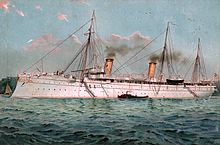Guido von Usedom (Admiral)

Guido von Usedom (born October 2, 1854 in Quanditten ( East Prussia ), a now submerged place in the Zelenogradsk Rajon ; † February 24, 1925 in Schwerin ) was a German admiral in the First World War .
Life
Early years
Guido came from the Pomeranian noble family Usedom and was the son of Lieutenant Kuno von Usedom (1804–1855). He joined the Imperial Navy on May 31, 1871 . After his training and initial experience on the border, he was given his first command. For a time he served as Prince Heinrich's adjutant of Prussia .
In October 1895, Usedom, as corvette captain, was in command of the Aviso Arrow until the end of the year , and from March 1896, command of the Aviso Jagd followed for half a year . From September 1896 to July 1898 he was in command of the coastal armored ship Hagen and was promoted to corvette captain with the rank of lieutenant colonel during this time . He then became the commander of the large cruiser Hertha , which had just been put into service , on which he was appointed frigate captain and promoted to captain at sea (September 18, 1899).
Use in the Boxer Rebellion
Usedom was deployed with Hertha in the Mediterranean and East Asia. At the beginning of the Boxer Rebellion , the commander of the East Asia Squadron , Vice Admiral Felix von Bendemann , ordered landing corps to be formed from the crews of all German cruisers to help protect the European embassies in Beijing . Usedom became the leader of the entire German expeditionary force of about 500 men, which was subordinate to the British commander of the foreign armed forces involved, Vice Admiral Seymour . Usedom was also its chief of staff .
On June 10, 1900, the entire expeditionary force left Tanggu by rail for Beijing. The advance was stopped by Chinese troops and insurgents, so that the expeditionary force had to withdraw by land. The commander of the British landing corps, Captain Jellicoe , who later became the commander of the Grand Fleet in the Battle of the Skagerrak , was wounded. In this distressed situation Seymour requested the use of the German troops under Usedom and is said to have spoken the historical phrase "The Germans to the Front".
Because of his experience with the landing corps, Usedom was released from the leadership of Hertha in September 1900 and assigned to the staff of the commander-in-chief of the allied troops in China , which enforced the end of the uprising. In parallel to this task, he had already been formally appointed as wing adjutant to the emperor on July 21, 1900 . On April 5, 1902, Usedom was awarded the Pour le Mérite order for its achievements in China .
Time before the First World War
In August 1902, Usedom took command of the imperial yacht Hohenzollern , which he held until October 1904. He then became inspector of the I. Marine Inspection and in this capacity was promoted to rear admiral on March 14, 1905. At the same time, he was from September 1905 the deputy of the chief shipyard director and from January 1906 chief shipyard director of the Kaiserliche Werft in Kiel . On August 21, 1908 he was promoted to Vice Admiral and year-end 1910 award of the character as Admiral for disposition made.
Head of the Special Command Turkey in the First World War
In August 1914, Usedom was reactivated and sent to Constantinople as head of the special command Turkey . Because the signs of an operation by the Triple Entente against the Dardanelles increased and the risk of conquering the capital of the Ottoman Empire increased, Usedom was appointed Commander-in-Chief of the Straits in agreement with the Turkish government.
The funds available for this task were extremely small, and Usedom managed by demonstrating the expansion of coastal positions, sometimes without staff for the occupation of the forts further inland. He also had minefields laid. In mid-February 1915, Usedom succeeded in manning the heavy artillery in the most important forts along the straits and had extensive minefields laid in the straits. The French ship of the line Bouvet and the British ships of the line Irresistible and Ocean sank on these mines in the course of the Dardanelles operation .
The further course of the beginning battle of Gallipoli was determined less by Usedom than by the leadership of the Turkish land forces by the German general Otto Liman von Sanders . After the end of the battle, Usedom stayed in Turkey until the end of the war and was awarded the oak leaves for the Pour le Mérite in August 1915. In January 1916 he received the patent as an admiral. He retired on November 26, 1918.
literature
- Dermot Bradley (eds.), Hans H. Hildebrand, Ernest Henriot: Germany's Admirals 1849-1945. The military careers of naval, engineering, medical, weapons and administrative officers with admiral rank. Volume 3: P-Z. Biblio Verlag, Osnabrück 1990, ISBN 3-7648-1700-3 , pp. 473-475.
- Hans H. Hildebrand, Albert Röhr, Hans-Otto Steinmetz: The German warships. Volume 3, 1st edition, Herford 1981, ISBN 3-7822-0211-2 .
Individual evidence
- ↑ Elmar B. Potter, Chester W. Nimitz , Jürgen Rohwer : Seemacht. From antiquity to the present. Munich 1974, ISBN 3-7637-5112-2 . P. 367 ff.
Remarks
- ↑ corresponded to the rank of frigate captain introduced on November 23, 1898
| personal data | |
|---|---|
| SURNAME | Usedom, Guido von |
| BRIEF DESCRIPTION | German admiral in the First World War |
| DATE OF BIRTH | October 2, 1854 |
| PLACE OF BIRTH | Quandits |
| DATE OF DEATH | February 24, 1925 |
| Place of death | Schwerin |




